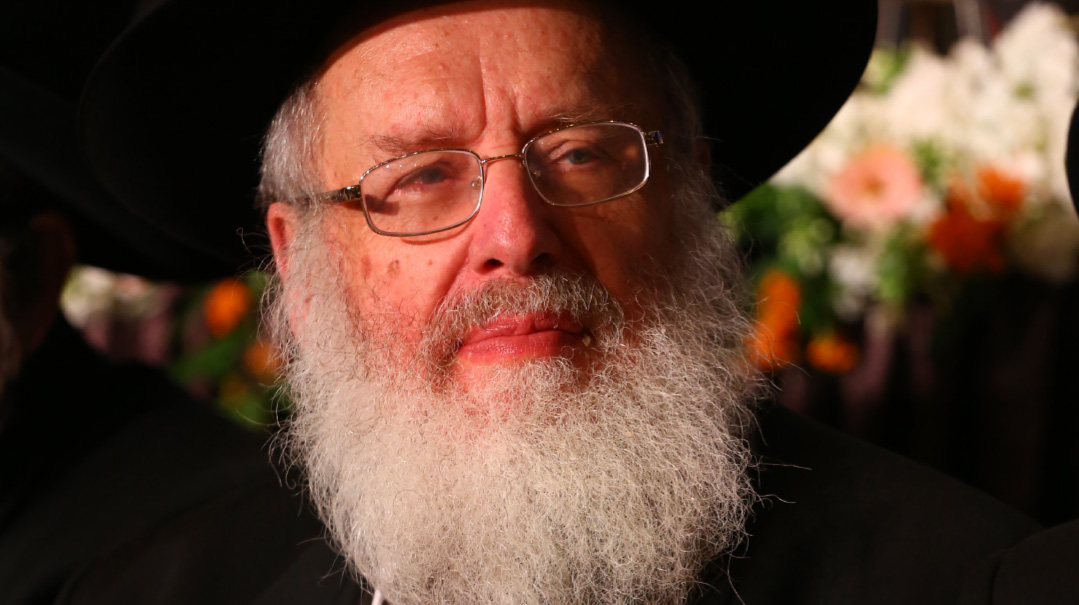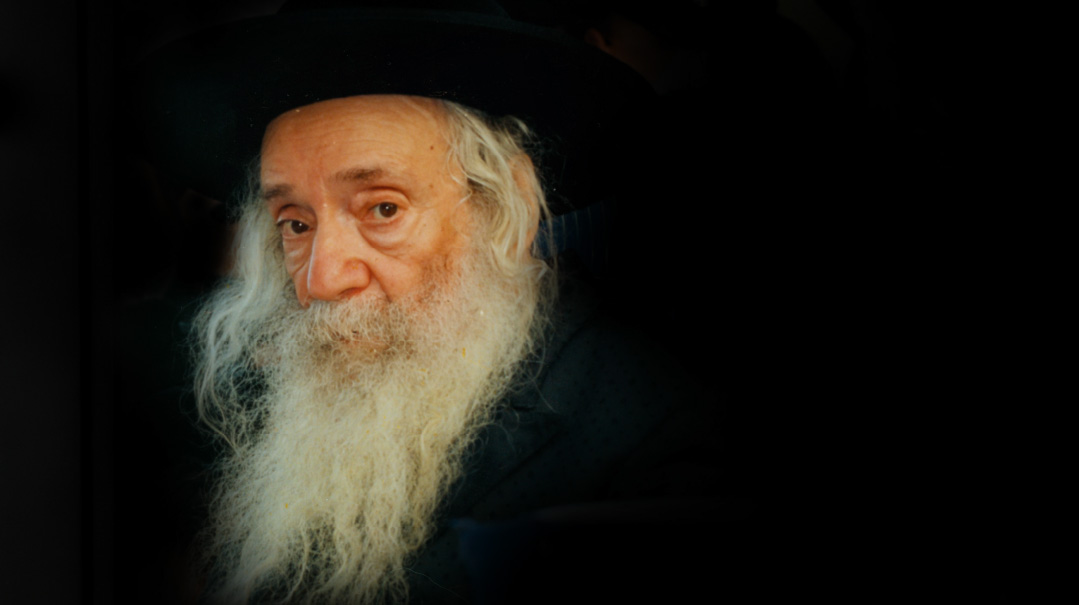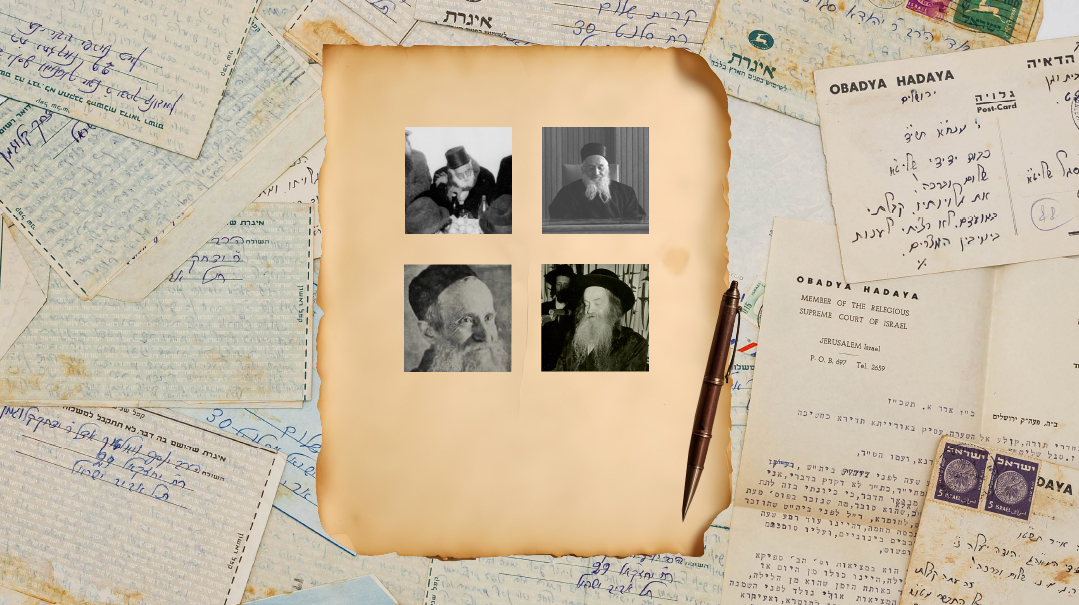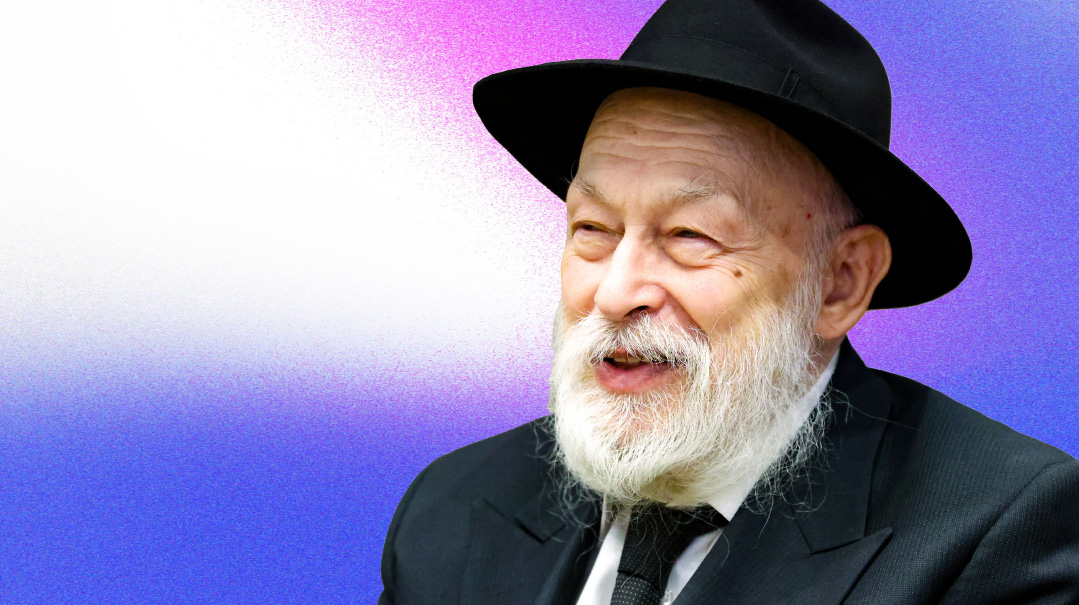Soul Producer

By combining song with spirit, Naftali Schnitzler brings Jews closer to the greatest Composer of them all

His songs are universally sung and his music never ceases to inspire. But Naftali Schnitzler is content with taking a background role rather than seeking fame for himself. Because for him, it’s not the music, but the message, that matters. By combining song with spirit, Naftali brings Jews closer to the greatest Composer of them all.
There’s a song that was released in 2019 called “Far Dir,” a beautiful rendition of the Friday night zemer, “Kah Ribon.” Following the low part, there’s a pre-chorus bridge that goes like this:
Far Dir, Far Dir
Nahr Far Dir
Ant hu malka melech malchaya
For you, for you, only for you. You are the King, the King of all kings.
I’m not in the music review business but take this story for what it’s worth. Yeshiva Ateres Shimon in Far Rockaway, New York, has a Thursday night hachanah l’Shabbos session every week. Loosely defined as “kugel, kishke, roast, and lots of singing,” hachanah l’Shabbos is a weekly highlight for the talmidim — and beyond. A neighborhood boy whom life has thrown a curveball or three likes to swing by the hachanah l’shabbos and join in the camaraderie.
There is an unspoken rule in the yeshivah.
No singing “Far Dir” until he comes. And if someone forgot the rule, then it must be sung again once he arrives. Because Yiddishkeit might be a struggle for him, but, somehow, the spirituality pulsating within that song ignites the soul that finds inspiration so elusive.
And he’ll never pass up on that opportunity.
The song was composed by Cheskie Weizs and produced by Naftali Schnitzler. “When the words far Dir came up,” says Naftali, “in a moment I saw the whole klal Yisrael singing this song. It expresses the closest connection to Hashem. I almost felt that once we have this song, there’s no need for any other. It includes everything.”
Long before the public knew the song, Naftali saw this boy, breaking free from insurmountable challenges, eyes clenched tight, singing “Far Dir” with all his heart, all his love, and all his unspoken devotion.
Naftali sees things like that. His imprint is all across the Jewish music industry, and many singers owe their careers to him. He envisioned their success long before it existed. Just like he saw this boy’s fervor before the spark was even kindled.
Today, Naftali takes us into the studio where visions actualize and more are created. They come in all sorts of colors, thoughts, and emotions, but all share a common denominator.
Far Dir, far Dir, nahr far Dir.
For Naftali, music is about something much greater than himself.
I
had this sixth sense that if I’d ask Naftali to order overnight potato kugel for us to snack on during our meeting, I’d get more than I bargained for. It’s not so nice to solicit food — especially when your wife packs you with plenty — but this was Williamsburg! How could I travel from Cincinnati to Williamsburg and not take a stab at some authentic heimish cuisine? Sure enough, the potato kugel came with a side dish consisting of a pastrami sandwich, fries, kishke, chicken soup, and an assortment of drinks.
Naftali’s studio — which is actually a temporary rental — is situated in a low, nondescript building with pale yellow brick situated in gritty Williamsburg, where pastrami sandwiches are far more available than parking spots. There’s no identifying marker indicating the entrance to a studio that’s home to so much iconic music, so I take a guess at a plain metal door and it turns out that I’ve guessed right.
Almost immediately upon entry, directly to the left, there’s another door leading into the studio. It’s small, but there’s a casual air that makes the limited space seem welcoming rather than cramped. The feast fit for a king (a heimishe one anyway) teeters dangerously on a small wooden table standing before an old, worn couch.
Generosity, as it turns out, isn’t ancillary to Naftali’s journey. It is, in fact, the very essence of his story.
“I always wanted to create and produce,” he says. “I have a great passion to find people with unrealized talent and bring out their potential.” This desire — now manifest in his many accomplishments — existed even before he understood what its materialization would entail.
“There is a fellow in Monroe, where I grew up, named Naftali Yosef Mendlowitz,” Naftali relays. “He had a recording studio, and was very supportive and encouraging of my ambitions. I would always tell him that I want to produce someone, to make someone really shine. I wasn’t even sure what that meant but I knew that I wanted to do it.” One day, Naftali got a call. It was Naftali Yosef and he had an important message to share. “I think I have someone for you. His name is Shmuel Ber Weber, he sings very nicely.”
Naftali met up with Shmuel Ber — now widely acclaimed as “Beri.” “He told me that he was thinking of singing at simchos like a bar mitzvah or sheva brachos. I looked at him and said, ‘But you’re much bigger than that!’
“I saw that there was something different about his singing, and he had a special charisma,” Naftali explains. “I also saw that he has flexibility in terms of what he can sing.” Naftali concedes that there was an additional motive behind his desire to work with Beri. “I wanted to promote chassidishe music. I wanted the world to see that chassidim have something to offer. I also felt that, through Beri, I could present chassidishe music with a twist that people didn’t know existed.”
Along with a close and very talented friend, David Kaufman, Naftali began working with Beri, producing and arranging his music, but, more importantly, reiterating his confidence in the young singer’s talent and potential.
If Naftali has high regard for Beri’s talent, that feeling is mutual. “Naftali’s abundance of talent is overwhelming,” says Beri. “It’s too much to express in words. That’s why he never talks about himself — he can’t describe who he is. He only does. He gets things done as if he’s five people. He takes care of every step of the work from music production to guiding vocals — even does basic secretarial work — and the list goes on. And he has such a kind heart, almost too kind.”
Beri is very far from the only one whose career Naftali helped to develop. In fact, it’s hard to find a figure in the modern music industry who hasn’t worked with Naftali on some level or another. To name just a few, the list includes: Hershey Weinberger, Pinky Weber, Yoeli Greenfeld, Shimmy Engel, Motti Ilowitz, Avraham Fried, Lipa Schmeltzer, Shmueli Ungar, Dovy Meisels, Zanvil Weinberger, Mordechai Ben David, Benny Friedman, and Tzaly Gold. But the list is far, far, longer than that.
“I continue to maintain a relationship with all of them, helping out where I can,” Naftali tells me. “As far as my current projects, I am now working with Gershy Uri, Dovi Meisels, Sruli Altman, Yaakov Shwekey, Shaya Gross, Ari Hill, Avraham Fried, Zanvil Weinberger, Shmulik Klein, Hershey Weinberger, and Lipa Schmeltzer.”
Dovy Meisels, who has been making waves with the exceptionally beautiful songs he’s released in the past few years, is direct in his attribution of all his success to Naftali Schnitzler. “When I was still a bochur, I was singing at a wedding and Naftali came over and told me that he loves the way I sing. I was shy and uncomfortable but he was so supportive. Over the next few years, I would consult with him regarding every move I made in music. He sees the nature of a person. When he looks at someone, he sees him five or ten years down the road.”
Naftali explains the internal process that fuels this intuition. “I listened to Beri’s singing and had to identify his place in the market. I considered his voice, his level of warmth, his chassidic affiliation, and based my production off all of those.”
J
ust as he can zero in on a future star, Naftali has an uncanny knack for predicting what song is going to be a hit. Many have wondered how he does it and the answer, says Naftali, is the opposite of what you might think. “Conventional thinking would dictate that, to create a hit, you follow the pattern of previous hits. But that is precisely what I don’t do. Never follow patterns. To be successful, you always have to start fresh.”
But if not from the springboard of already-composed music, what, in fact, is the starting point? “Purpose,” says Naftali. “You have to start with a sense of purpose. You ask yourself, what am I trying to do? What message do I want to share? What do I want to offer Klal Yisrael?”
The answer to these questions, Naftali says adamantly, can never be self-focused. It must always be about something greater than yourself. “Devarim hayotzin min halev nichnasin el halev,” says Naftali, “that which emanates from the heart penetrates the heart. That’s the secret behind a hit.”
This perspective resolves a seeming contradiction in current musical trends. On the one hand, chassidish music is growing increasingly popular, with traditional Yiddish lyrics expressing deep spiritual yearning. On the other hand, there is also a push toward freestyle Hebrew lyrics with more of a soft-rock sound.
“It all comes down to neshamah,” Naftali explains. “People long for connection. So long as the music speaks to the neshamah, it will be appreciated and accepted.” Naftali quotes the idea found in the Mishnah in Sanhedrin, that every Jew is an “olam katan — a miniature world.” “We all contain a little bit of everything and, therefore, we will relate to all different kinds of music. Sometimes we’ll be in the mood of a fast, upbeat song, at other times, we will want to listen to something slow and soulful. But the common theme through it all is that it has to come from the neshamah.”
Naftali’s adeptness at pinpointing a song’s “neshamah factor” might stem from the fact that he has enough of that to go around. “Naftali gets a song in ten seconds,” says composer Yonah Lipshitz. “He has a natural feel for what’s musically right and what’s wrong. But it’s not only taste. He has a tremendous neshamah, and, with that, he’s able to feel if a song has potential.”
His aptitude at tapping into the neshamah is what affords Naftali the ability to match song to singer. “If a singer comes in and says, ‘I want to sing something that sounds like such and such,’ I tell him that it won’t work. You can’t make your unique contribution to the music world by copying something else.” The song, Naftali repeats, must come from the neshamah — it must be something new, something unique to you. Matching a song with a singer is like a shidduch of sorts; the spiritual charges within must be compatible.
There’s no method or science to how Naftali identifies the “neshamah” of a singer. “It’s an intuition. It’s a brachah that Hashem gave me.”
Through this brachah — or series of brachos — Naftali had succeeded in acting upon his passion, helping shepherd young artists into acclaimed singers.
But what, exactly, is Naftali’s passion? How do you define it? Is it all about helping others?
“I am trying to define my passion,” Naftali admits. “I always wanted to help people. Even as a child. I remember a boy joining my class. For some reason, he wasn’t able to break into any social group. He was all alone. I thought to myself, I am going to turn this around. It took me a year to succeed.”
But succeed he did and the boy was able to change tracks dramatically because of the vision, the concern, and the passion of Naftali Schnitzler.
IF
Naftali had clout among his peers in school, it may be partially due to his academic prowess as much as his popularity. The spiritual undertones of Naftali’s music are easily discernible, and for good reason. “I very much enjoy learning,” he says. “I did well in school.”
Born and bred in Monroe’s Satmar community, Naftali attended Satmar cheder until eighth grade, and then the Satmar Yeshiva, where he learned Yoreh Dei’ah and got semichah from the Rebbe, Rav Aharon Teitelbaum.
But much as his communal affiliation is that of Satmar chassidus, his academic and spiritual aspirations span a much broader circle. “I like learning Breslov and Chabad seforim,” Naftali shares, “and I love learning the Torah of the Baal Shem Tov. I cry when I learn Baal Shem Tov.”
Many of the songs Naftali produces carry notes of those learning sessions. The first album of the Yingerlach series — a production Naftali is very proud of — featured the hit song “Davenen,” composed by Hershy Weinbeger. The lyrics are in Yiddish:
Heilige Bashefer, Ihr hust gebeten davenen … davenen far Dir
Groise Bashefer, Ich vil yetzt davenen … davenen far Dir
Holy Creator, You requested that we daven before You
Great Creator, I would like to now daven before You
Aside from producing the song, Naftali composed the intro, which perfectly reflects the stir of emotion as one prepares to stand before his Creator in prayer. Not surprising that this song also contains that same phrase. Far Dir, far Dir. It’s a theme firmly etched onto Naftali’s heart.
“When we first put together this song,” Naftali reveals, “we felt it had too much of a Breslov feel to be accepted in the mainstream chassidish world.” Speaking to Hashem in such openly candid terms is regarded within the Breslover school as highly virtuous but less so outside of it. “But we went ahead with it anyway.” And ultimately the song was a hit all around — sung, played, and enjoyed across spectrums.
Though it’s slower and more plaintive, a similar dialogue is found in the song “Sukkaleh,” a Cheskie Weizs composition produced by Naftali. The song is structured as a tefillah, beseeching Hashem that, just as we build our succah, so too, may He build His “Succah” — a reference to the Beis Hamikdash.
Vehn vest du bo’en Deine sukkeleh
Bo shoin Tatteh dein heilige sukkeleh
When will You build Your Sukkah
Build already Your holy Sukkah
The immediacy of expression, spoken in a rich chassidishe Yiddish, is very much a reflection of Naftali’s soul-connection with the Baal Shem Tov, Breslov, and other chassidic works.
But while Naftali’s music has definite chassidish tones, it veers from tradition in the sense that it’s largely electronic, with a lot less instrumentals than the classical norm. “People think I do that to save money,” says Naftali, “but that isn’t at all the reason.”
As a producer, Naftali explains, it is his job not to “over-produce.” He explains with a metaphor. “Imagine if you receive a gift, and the wrapping is nicer than the gift. That ruins the purpose and the effect of the gift itself.”
The same applies to the interplay between musical arrangement and the singer’s rendition, he says. “The singer is the gift, the music is the wrapping. If you overdo the wrapping, you overwhelm and ultimately devalue the singer’s offering.”
Naftali thus avoids escalated musical accompaniments, allowing for the singer’s voice to maintain prominence. “At the same time,” Naftali qualifies, “being minimalistic also requires a skill. You have to know how to cut back.” The objective, Naftali explains, is to wrap the gift in a way where you are “excited to get it but still surprised when you open it.”
By keeping the music calculatedly reserved, the singer — or the “gift” — is given space to shine.
This approach is reflective of Naftali’s entire perspective of his job description. One of my first questions upon beginning the interview was , “What is a producer?”
Surprisingly, Naftali wasn’t quick to answer. “I’m not sure what the official definition is,” he said, “and I’d be curious to google it.” But, Naftali went on to explain, his own definition is to essentially produce people by taking baby-step beginnings and pivoting them toward ambitious ends.
“I am not just the producer,” Naftali explains. “I produce, I arrange, and I compose.” This, he says, is not unusual in the frum music world. But it’s the less musical part of the job that Naftali sees as significant and meaningful. “I am also a vocal coach and, in a way, a therapist.” Naftali holds an open and sympathetic ear, calming fears and instilling confidence.
One of the many, many composers that Naftali has worked with is Yitzchok Honig, whose debut single was released in 2020, a heartfelt rendition of “Mi Ban Siach” composed in honor of his son’s wedding. “I worked with Naftali on that song,” he says, “and, in the process, we became such close friends. I made another chasunah a year later and, by that time, we were so close that Naftali came with a beketshe and shtreimel (worn to chassidishe weddings only by family members and close friends).”
This is a common theme among Naftali’s clients. The relationship jumps from professional to social within moments of meeting one another.
“He’s a hartzige mentsch,” says Dovy Meisels. “He’s like a brother to me.”
Independent as he is in his musical career, Naftali had many mentors along the way. “Moshe Goldman had a very big influence on me,” says Naftali. “But really, the influence was Moshe Laufer who composed Goldman’s intros and arranged the music.”
Another singer that made a great impression on Naftali was Zishe Schmeltzer, the older brother of Lipa Schmeltzer. “And Mordechai Ben David was very encouraging,” says Naftali. “He would use me as a one-man band on many occasions. He was always so warm to me, he treated me with a type of ‘fatherly’ love.”
If MBD was like a father, Lipa Schmeltzer was like a brother. “Lipa always pushed me ahead. He’s the one who made me get to where I am today.” Naftali also holds a deep debt of gratitude to Tzaly Gold, with whom he is exceptionally close.
And then there was the legendary Michoel Schnitzler, Naftali’s uncle who — in Naftali’s words — “was a tzaddik.”
Michoel, who made an invaluable contribution to the world of Jewish music, passed away tragically in April of this year. “Michoel was my father’s older brother,” says Naftali. “We were very close. He used to bring me peckelach of candy to shul on Shabbos.” But then Michoel gave him a bigger gift: “When I was around nine years old, he bought me my first keyboard.”
This was the first step on a path that Naftali continues to careen across. “I remember one of my rebbeim saying that we should not own musical instruments, that it is bad for our ruchniyus. I remember thinking, How can that be? How can there be anything wrong with music? Can’t it bring one closer to the Ribbono shel Olam?”
Even at that young age, Naftali knew that music can be created for Hashem.
Far Dir, far Dir.
Nahr far Dir.
Naftali’s passion to help people realize their potential is ever ambitious. Lately, he has been formulating, and cautiously pursuing, a systemized method within the frum community that would allow undeveloped artists — of any field — to help realize their dreams. This system would revolve around a series of seminar-like networking events. Following a rigorous curriculum, the artists would help each other gain clarity, vision, and practical tools that would then allow for a well-paved path toward success.
“There are so many talented people who don’t know where to start in terms of allowing themselves to shine,” Naftali explains. He sees four issues as primary obstacles for development of talent. The first is validation. “Artists struggle to feel validated,” Naftali explains. “They feel that they should ‘just get a job.’ This is especially true when they have a wife and children. A first step in overcoming this feeling is by networking with others going through a similar phase.”
The second issue is clarity. As long as talent exists in subsurface capacity, it is exceedingly difficult to envision any functional manifestation. “But through our curriculum, we create a mechanism where, by speaking to one another, and through guidance by coaches and mentors, each artist can develop a distinct image of where he wants to take his talent.
The third issue is accountability. For productivity to exist there needs to be accountability. These regular workshops would serve as an apparatus to ensure that each artist is held accountable to reach his aspired-to goals.
The fourth issue is a stagnant mindset. “This is important,” Naftali states. “Artists must be encouraged to look beyond themselves. The curriculum would require reading or watching content from other artists which would expand our horizons and help develop a growth mindset rather than a fixed one.”
It doesn’t end there. Naftali has an entire separate vision for children’s education. “For someone to achieve his potential, he has to have a happy and loving upbringing,” says Naftali. “When children are happy, they are more receptive to information, and therefore, are armed with the tools they need for success. Once they have that then they will find their mission on their own.”
To reach this end, Naftali envisions creating a model where one centralized organization continually produces entertaining content, all focused on Torah and Yiddishkeit in some fashion or another. This could mean anything from illuminated mishnayos to videos about Yetzias Mitzrayim and well beyond. The common theme would be that it would bring Torah to life in a way that is upbeat, enjoyable, and easy to relate to.
IT
all sounds impressive — but a bit vague. Then I get my chance to see production in action. Into the studio walk two chassidishe men, their stride expressing both confidence and excitement. Naftali’s studio fosters exactly that attitude, it’s like the home of your favorite uncle; you’re perfectly comfortable there but, being that he’s not your parent, it’s that much more relaxed. Introductions are shared and it turns out that these two fellows are Ari Hill and Shaya Gross, both well-known names in the music industry. Shaya is most famous for his “V’afilu b’Hastara,” which was wildly popular a few years back, and Ari is the voice to the “Abba Melech Ha’Olam” song.
Suddenly the whole studio comes to life. Naftali sits down at the keyboard and a brand-new song that he just recently composed wafts from the keys as his fingers spin something magical. Ari bends down beside him, singing along, but then Natali stops short. “No,” he says sternly, “it goes oooh, not aaah.” And so it goes, oohs and aahs and ups and downs.
Now it’s time to record. Ari sings a few bars into the mic as Naftali sits before the screen. He presses some buttons and suddenly, the song Ari just sang reverberates throughout the studio, accompanied by blaring, upbeat music. Ari sings a few more takes until Nafali is satisfied.
“You need an intro,” he says, and his forehead creases in thought. He hits a few buttons and a tune begins to pulse through the computer screen. A bunch of grids and colorful squiggly lines that made no sense to me appear and Naftali nods his head. “Okay, that’s a good intro.”
I’m stunned. “You mean that’s it? The song is recorded?”
Shaya Gross leans over to me. “Naftali is amazing. He gets a song done in twenty minutes.”
The rapidity with which the intro was composed is apparently nothing new. Avrumi Lunger, a young Skverrer chassid, serves as the manager of Naftali’s studio. “Sometimes I’ll be on the phone with Naftali and he’ll say, ‘One second, I’ll call you back, I just thought of an intro.’”
The song Ari just sang, Naftali projects, will be the next big wedding hit. Its central theme — with a bunch of Yiddish phrases and suspense-building bridges between — is Hashem Echad Ushmo Echad. My musical talent is just about non-existent but, even as I write this article a few days later, the song still echoes in my mind.
Saying goodbye to Naftali and his studio is like emerging on dry land after a deep-sea dive. It is its own little universe — an “olam katan,” as Naftali might say. It’s hard to part from that warm and inviting room, seemingly small, but big enough for visions to be actualized and more created.
But my Uber is waiting. So I pull away from the pale yellow brick building, presumably still reverberating with the clarion call, “Hashem Echad Ushmo Echad.” In fact, I’m sure it is. Hashem Echad Ushmo Echad is the song behind the songs.
Because for Naftali, it is all far Dir.
Nahr far Dir.
Naftali Schnitzler’s musical picks
My favorite melody for Kedushah: “Bald Bald” from the Yingerlich album
My favorite song to start a kumzitz: Right now it’s “Bizen Kretchme”
The most underrated instrument in Jewish music: Definitely the piano
My favorite Yiddish song: Michoel Schnitzler’s “Yesimchu Eloikim”
My favorite English song: Abie Rotenberg’s “Mame Rochel”
My favorite Ivrit song: Chaim Yisrael’s “Malachim Hakedoshim”
The song I just knew would be a hit: Shmueli Ungar’s “Li’kuved Shabbes” — I just felt it!
The song that says “Chanukah” to me: The Satmar song, “Ilchu Usisu”
The secret key that makes a singer succeed as a live performer: Being in his zone, being natural, and not trying to impress others
(Originally featured in Mishpacha, Issue 989)
Oops! We could not locate your form.







